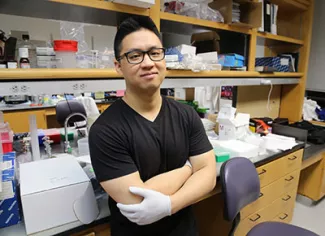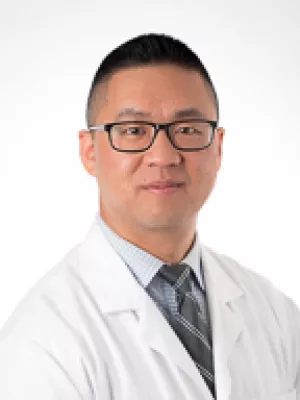Biography
Education
| Institution | Degree | Dept or School | End Date |
|---|---|---|---|
| University of California, Berkeley | MS | Health and Medical Sciences | |
| University of California, Berkeley | BA | Public Health, Infectious Diseases and Vaccinology | |
| University of California, San Francisco | MD | Medicine |
Clinical Interests
General Surgery
Transplant Surgery
Program Affiliations
Howard Hughes Medical Institute
Surgical Innovations Programs
UC Berkeley-UCSF Joint Medical Program
UCSF Program in Medical Education for the Urban Underserved
Research Narrative
Before his acceptance in the General Surgery Residency Program, Dr. Chu was a medical research fellow in the Transplantation Research Laboratory, co-mentored by Dr. Qizhi Tang and Dr. Peter Stock in the Department of Surgery. He received his B.A. in Public Health at the University of California, Berkeley and his M.S. in Health and Medical Sciences through the UC Berkeley-UCSF Joint Medical Program. Simon is also a member of the PRIME Program in Medicine for the Urban Underserved at UCSF. His longstanding interest in the human immune system has lead him to numerous research investigations.
In the laboratory of Dr. Warner Greene, he identified two unique proteins in seminal fluid that contributed to the enhancement of HIV infection and served as potential new drug targets in the creation of multi-combinational antiviral microbicides. In his graduate studies in the laboratory of Dr. Joseph "Mike" McCune, he characterized the role and mechanisms by which gut-resident commensal bacterial species can inhibit inflammatory pathways in the gut, which has been associated with HIV disease progression. He is currently pursuing the Doctor of Medicine degree at UCSF.

Currently, Simon N. Chu is a Howard Hughes Medical Institute Fellow pursuing investigations into the immunological basis of enhanced transplant rejection in HIV-positive solid organ transplant recipients. In a large multi-site clinical trial of liver and kidney transplants in people living with HIV, recipients were found to have a 2 to 3 fold higher rate of rejection compared to age-matched individuals without the virus. This observation was unexpected and counterintuitive, given that such individuals are virally immunosuppressed. In order to make transplantation a safer and more efficacious option for people living with HIV who develop end-stage organ failure, he aims to identify pre-transplant immunological correlates of rejection in this patient population. By utilizing high-dimensional flow cytometric and multiplex gene expression analysis, he is seeking to identify novel biomarkers associated with the development of acute cellular rejection. In the era of precision medicine, these results may help transplant clinicians and surgeons identify at-risk patients and allow for individualized tailoring and targeted escalation of immunosuppression. Lastly, these studies will serve as a catalyst towards identifying new immunologic mechanisms responsible for this paradoxical enhanced rejection.
In addition to his basic science immunology research, Chu also conducts multidisciplinary research in translational biomedical device development and surgical education. He is the Clinical Lead of the Tabla Research Team for the laboratory of Shuvo Roy PhD, in the Department of Bioengineering. Utilizing a low-cost, non-invasive acoustic diagnostic device, he directs two clinical studies to characterize fluid accumulation during respiratory illnesses such as pneumonia and heart failure exacerbation. Combining audio processing methods and machine learning algorithms, this work aims to assist clinicians in the rapid and accurate diagnosis of lung disease.
Furthermore, in the research group of Patricia O'Sullivan, his research in surgical education aims to better understand the unique and challenging teaching environment of robotic surgery. Through qualitative analysis of the complex instructional behaviors and interactions between attending surgeons and residents, his efforts are guiding the development of a structured, evidence-based robotic surgery curriculum for surgical trainees.
Chu's research has an excellent track record of public and private funding, with publication in respected peer-reviewed journals. His work has been presented and recognized nationally and internationally. In 2018, he was awarded the School of Medicine Dean's Prize for Research and Scholarship in Molecular Medicine for the second time.
Research Interests
Solid organ transplantation in persons with HIV
Immunological correlates of transplantation rejection and tolerance
Publications
- Developing machine learning-driven multidisease diagnostic platforms using immune repertoire sequencing.| |
 PubMed
PubMed
- Large language model agents can use tools to perform clinical calculations.| |
 PubMed
PubMed
- Engineering synthetic signaling receptors to enable erythropoietin-free erythropoiesis.| |
 PubMed
PubMed
- Dual α-globin-truncated erythropoietin receptor knockin restores hemoglobin production in α-thalassemia-derived erythroid cells.| |
 PubMed
PubMed
- Implantation of autologous induced pluripotent stem cell-derived islets provides long-term insulin independence in a patient with type 1 diabetes.| |
 PubMed
PubMed
- Dual α-globin and truncated EPO receptor knockin restores hemoglobin production in α-thalassemia-derived red blood cells.| |
 PubMed
PubMed
- Circadian clocks drive rhythmic antitumor immune responses mediated by migratory dendritic cells.| |
 PubMed
PubMed
- Discordant Timing of Hypoglycemic Agent Screening Causing Delayed Diagnosis of Sulfonylurea-Induced Hypoglycemia.| |
 PubMed
PubMed
- Everolimus, an mTORC1/2 inhibitor, in ART-suppressed individuals who received solid organ transplantation: A prospective study.| |
 PubMed
PubMed
- Teaching in the robotic environment: Use of alternative approaches to guide operative instruction.| |
 PubMed
PubMed
- Improved Detection of Lung Fluid With Standardized Acoustic Stimulation of the Chest.| |
 PubMed
PubMed
- Gut-Resident Lactobacillus Abundance Associates with IDO1 Inhibition and Th17 Dynamics in SIV-Infected Macaques.| |
 PubMed
PubMed
- Liquefaction of semen generates and later degrades a conserved semenogelin peptide that enhances HIV infection.| |
 PubMed
PubMed
- Interaction of fibronectin with semen amyloids synergistically enhances HIV infection.| |
 PubMed
PubMed
- Seminal plasma induces global transcriptomic changes associated with cell migration, proliferation and viability in endometrial epithelial cells and stromal fibroblasts.| |
 PubMed
PubMed
- Peptides released by physiological cleavage of semen coagulum proteins form amyloids that enhance HIV infection.| |
 PubMed
PubMed
- DNA fingerprint analysis of three short tandem repeat (STR) loci for biochemistry and forensic science laboratory courses.| |
 PubMed
PubMed

